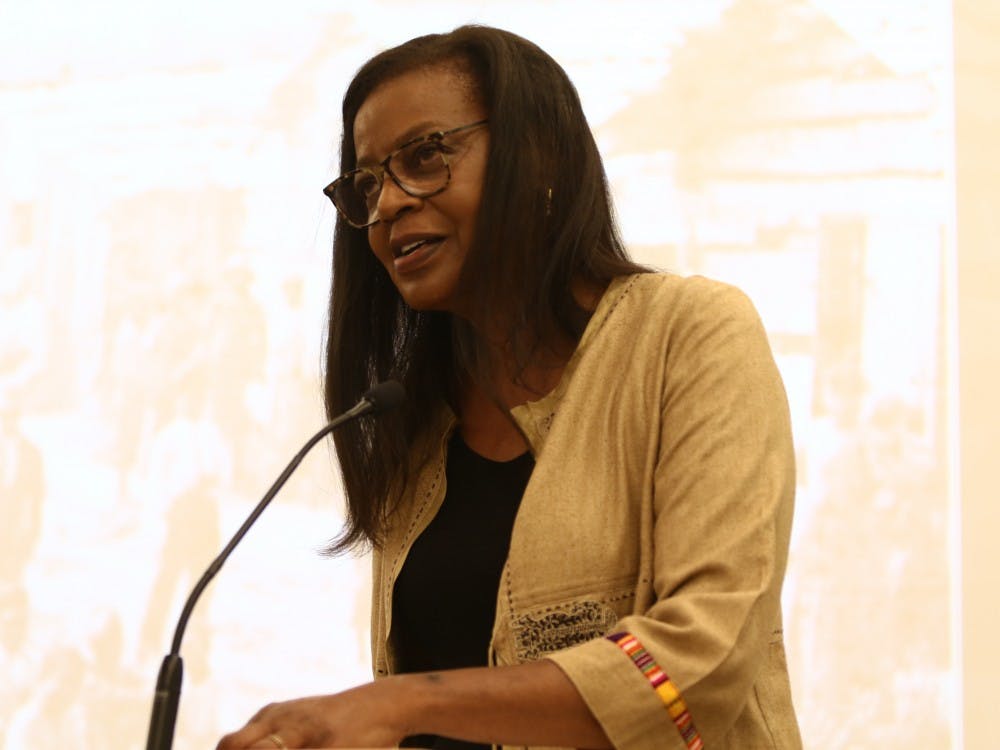Thavolia Glymph, professor of history and law, opened a Wednesday talk with an untold story from the Combahee Ferry Raid, in which Harriet Tubman helped rescue hundreds of enslaved people during the Civil War.
The room was nearly silent as Glymph painted a picture of a young black girl who made it within 19 yards of a Union boat to safety, only to be captured by Confederate soldiers.
She recounted many similar stories of enslaved persons trying to escape during the Civil War and focused on the silenced stories of black women in the post-Civil War period at the event entitled “Civil War Refugee Camps: Camp ‘Commandants’ and Black Women and Children.” Safety was not guaranteed, Glymph noted, as those who escaped often faced hardship and abuse in Union refugee camps.
“War-related death and trauma defined the lives of many Americans,” Glymph said. “But for African American women, much of this trauma appears as an unspectacular disability and has been invisible in our scholarship.”
Glymph first spoke of our current understanding of the Civil War. She emphasized that the story of the war cannot be reduced to a single statistic, such as the war’s 700,000 casualties.
“The Civil War claimed the lives of black people in large numbers and the lives of black women in larger numbers than white women,” Glymph said. “It claimed the lives of black children in larger numbers than white children. But black children have not figured into the calculation of the price paid during the war or after the war”.
It is for this reason that Glymph’s work aims to amplify and bring to light the stories of trauma that start from the “dilapidated” refugee camps for black women and children but extend far beyond the end of the war.
Glymph’s talk focused on the stories of two black women: Latisha Taylor, a soldier’s widow, and Union nurse Ann Stokes. Both women applied for federal government pensions, only to be met with intrusive questioning in Taylor’s case and invasive medical examinations in Stokes’.
Northern white women would never have been forced to endure these experiences, Glymph said.
It is for this reason that she considers the lives of Taylor and Stokes cases of “slow violence,” a reference to the idea of violence and destruction dispersed over time described by Rob Nixon, Currie C. and Thomas A. Barron family professor in the humanities and the environment at Princeton University.
These stories of slow violence are not included in traditional accounts of Civil War history, Glymph said.
“Women like [Taylor and Stokes] are absent—hardly a book on the Civil War mentions such women or mentions the casualties among black women and children,” she said.
This is despite the fact that, as Glymph argued, black women in the Union fought not only for their own freedom, but also for the freedom of the nation.
“Most Americans did not want to believe that African American women had any part to play in the war for freedom, that they had made any contributions to the war for the United States,” she said.
Glymph then flipped through her powerpoint slides and landed on an old photo.
“This is an African American woman during the Civil War,” she said, pointing to the image projected onto the screen behind her, “and pinned to her dress is a flag of the United States”.
This is the narrative that Glymph’s work serves to highlight.
“It’s here,” she said. “The documentation is here. And we’ve just ignored it.”
Get The Chronicle straight to your inbox
Signup for our weekly newsletter. Cancel at any time.

Preetha Ramachandran is a Trinity senior and diversity, equity and inclusion coordinator for The Chronicle's 118th volume. She was previously senior editor for Volume 117.

